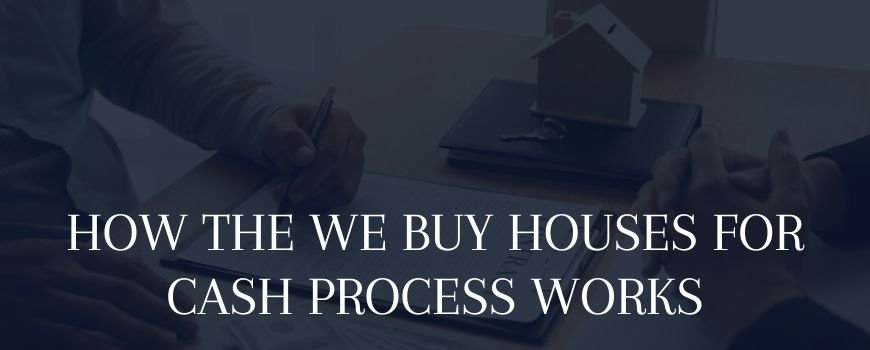You’ve seen the signs around town: “We buy houses for cash.” The message is proclaimed on billboards, kiosks, and bulletin boards, but how does “we buy houses for cash” work? Does someone actually hand you a suitcase full of cash in exchange for your home? Not exactly, but it’s closer than you might think.
The “cash for houses” market is booming. In fact, it’s estimated that about 20% of home sales are cash sales. It’s not for everybody, but if you’re looking for an alternative to the traditional home sale process, it might be worth considering.
How Does “We Buy Houses for Cash” Work?
In a traditional home sale, you start by contacting a real estate agent. The agent lists your home on the MLS, advertises the property, hosts open houses, and haggles with potential buyers. The process can take anywhere from a couple of months to a year or more.
In a cash-for-home transaction, there’s typically no agent involved. Instead, you sell your home directly to a real estate investor for an all-cash lump sum. The investor inspects the home and makes you an offer without lender financing. The whole transaction can be completed in as little as a week. You accept the offer, the investor writes you a check, and the listing closes.
Homeowners who choose this route typically earn about 65% of the home’s value, although the percentage can be higher depending on the condition of the home and the type of investor buying the property.
How Does the “We Buy Houses for Cash” Process Work?
The process is simple:
- You reach out to the investor and request an offer on your home. In some cases, the investor will reach out to you.
- Answer the investor’s questions and schedule a time for an in-house inspection. If you’re working with an iBuyer, the home inspection may not be required.
- Review your offer. The offer should be in writing, and it should include a guarantee of earnest money up front (usually about 1-2% of the final sale price). Be sure also to request proof of funds, usually in the form of a bank statement.
- Accept or decline the offer.
If you accept the offer, you’ll negotiate a closing date with the buyer and complete a Purchase and Sale Agreement contract, also known as a going-under contract. You should then receive any earnest money that was agreed upon before receiving your total lump-sum payment.
Who Buys Houses for Cash?
We mentioned that real estate investors buy houses for cash, but who are these investors and what’s in it for them? There are three major types of investors dominating this market, each with its own benefits and drawbacks for the home seller.
House Flippers
You’ve seen these investors on TV. They’ll purchase a home (usually in disrepair), pay for the upgrades and repairs, and then resell the property for a profit. House flipping is a booming market. In the fourth quarter of 2018, it represented over 10% of all home sales.
Benefits: A house flipper may be an ideal buyer if your home needs significant repair. They buy homes as-is, so you don’t need to worry about structural damage, code repairs, or just having a property that’s undesirable to the average buyer.
Drawbacks: A house flipper’s profit potential rests on their ability to buy for less, so they may offer you well below market value for your home. However, if the home already needs tens of thousands of dollars in repairs, it can be a wise move for some homeowners.
Buy-and-Hold Investors
These investors buy houses and use them as rental properties. Some are large businesses that buy homes in bulk. Some are vacation rental companies that buy up homes to use as vacation properties. Others are just affluent individuals looking to attain new revenue streams. In any case, the goal is to generate passive income by collecting rent from short- or long-term tenants.
Benefits: You can usually get more for your home than you would with a house flipper. Buy-and-hold investors typically seek out homes that are desirable, which gives the seller a bit of leverage.
Drawbacks: Buy-and-hold investors won’t accept just any home, and they’re usually not interested in fixer-uppers. You might have to make the repairs yourself before receiving a competitive offer.
iBuyers
This is a newer market, but it has become incredibly popular in recent years. iBuyers use sophisticated computer algorithms to estimate home values and pinpoint smart investment opportunities. In many cases, iBuyers will make an offer without physically inspecting the home.
After buying the home, they make minor repairs and resell it. Unlike house flippers, though, they seek homes that are in good condition. They earn their profit by imposing a service fee, usually between 6% and 10% of the home’s value—much like a real estate agent. They typically must sell a lot of homes to be profitable.
Benefits: iBuyers usually pay close to fair market value, with offers averaging around 98.6% of the home’s value. The process is also incredibly quick, as physical inspections are often waived.
Drawbacks: iBuyers are extremely picky. They’re looking for houses that will attract qualified buyers quickly, so they usually won’t settle for anything less than pristine condition.
Which Type of Real Estate Investor Should You Work With?
If you’re looking to sell your house for cash, you’ll need to work with the type of investor that’s most closely aligned with your goals and limitations:
- If your house is in excellent condition and you want close to full value, an iBuyer may be ideal.
- If your house needs significant repairs, a house flipper may be your best bet.
- If your house is in good shape but needs minor repairs, you’ll usually get the most value from a buy-and-hold seller.
However, it never hurts to reach out to multiple types of investors and see what options are available. There’s no risk in requesting an offer.
How to Know if a Cash House Buyer Is Legitimate
You have to be very careful when working with a real estate investor, as there are a lot of scams out there. Heed the following golden rules:
- Never pay money to receive an offer on your home. A legitimate investor will quote you for free and won’t ask you to pay up-front processing or administrative fees.
- Avoid any investor who uses pushy sales tactics or tries to pressure you to sell.
- Always receive your offer in writing.
- Research the fair market value of your home. You’ll usually get less when working with an investor, but you should at least know what you’re dealing with. If an investor offers you half of your home’s value, that’s a major red flag.
- Research the investor. Look for consumer reviews, testimonials, and complaints.
- Don’t do business with an investor who doesn’t offer earnest money up front and who can’t provide proof of funds.
Most importantly, don’t sign anything until you know exactly who you’re dealing with.
Should You Sell Your House to a Cash House Buyer?
Only you can decide whether or not you should sell to a cash house buyer. Consider the general pros and cons:
| Pros | Cons |
| You can be out in as little as a week | You may earn less than market value |
| You receive an easy lump-sum payment | Sale price is usually non-negotiable |
| No open houses, agents, or lengthy negotiations | Some investors are picky about the homes they’ll accept |
| No fees or commissions | You may need to vacate the house quickly |
| Many investors will purchase a home as-is |
Nearly 90% of home sellers still use the traditional real estate process, but it’s not for everyone. Selling for cash might be ideal for you if:
- You need to move quickly
- You’ve inherited an unwanted home
- You’re behind on mortgage or bills
- You’ve received a job transfer
- You’re going through a divorce
- You’re going through a bankruptcy
A cash-for-home transaction may also be a good choice if you just want to move quickly and avoid the hassles of a real estate transaction that could drag on for months.
At Get Fair Home Offers, we buy houses for cash in Los Angeles. We’ll buy your home as-is, in any condition, and we’ll ensure that you have money in hand in as little as 7 to 10 days. We’ll make a competitive, no-hassle offer based on the After Repair Value (ARV) of your home—there’s no pressure to accept.
Want to learn more? Call us at (626) 817-3351 to get started.

